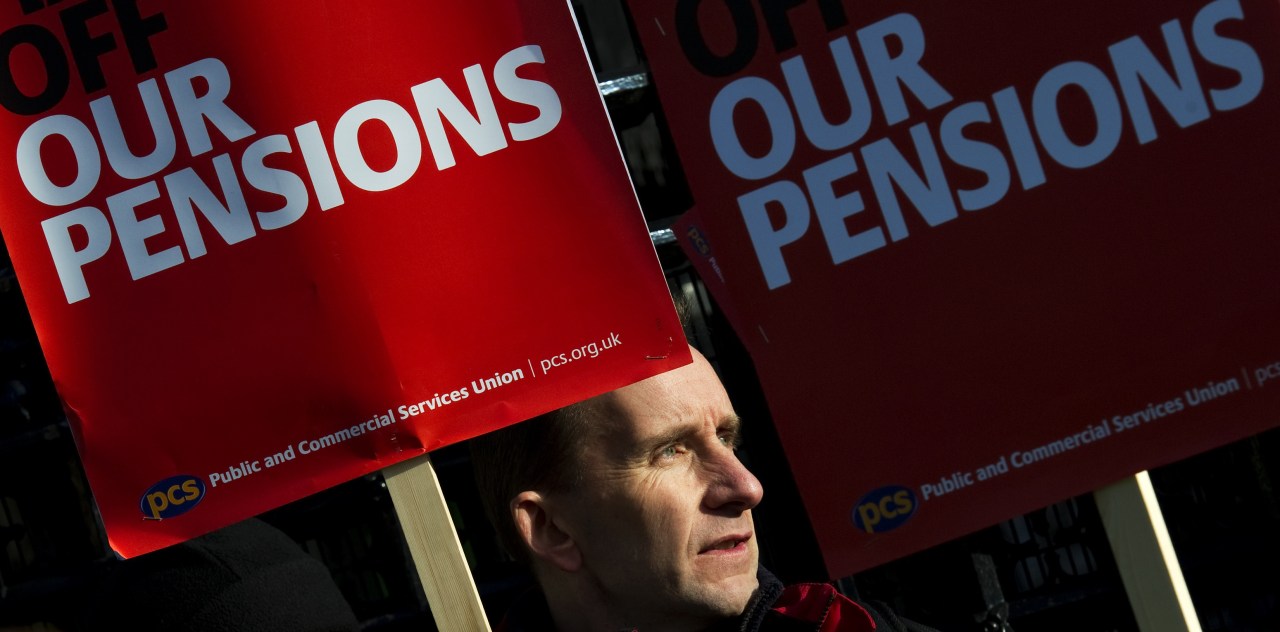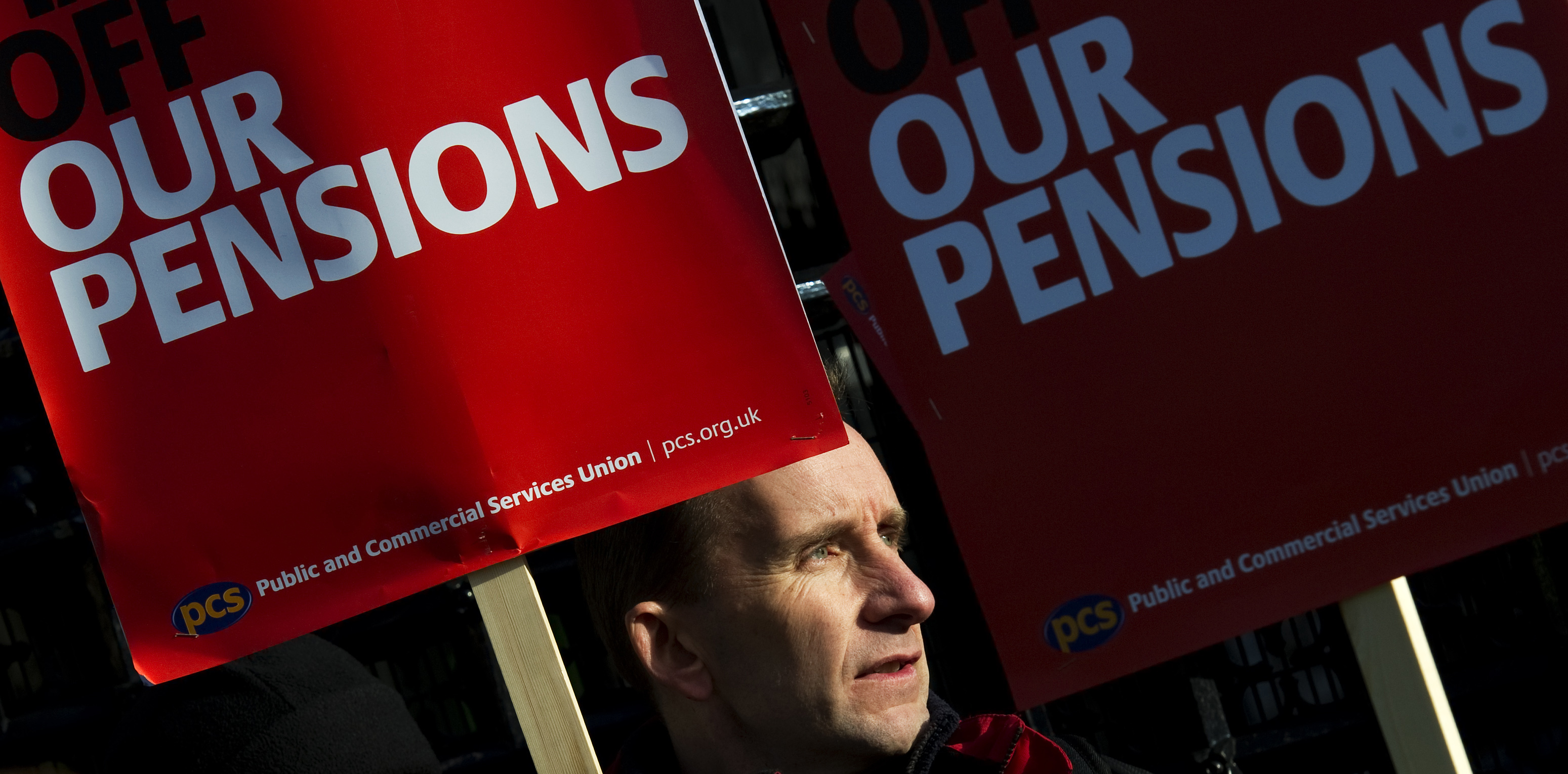 If I were a teacher, I’d be on strike today. Public sector workers are being asked
— in what is now a well-rehearsed soundbite — to work longer, receive less, and pay more. In these austere times, with deficit reduction a necessity, two of those three aims might
be reasonable. But doing all three at once, and conflating the package with the spurious notion that public sector pensions are ‘unsustainable’, justifies the direct action being taken
today.
If I were a teacher, I’d be on strike today. Public sector workers are being asked
— in what is now a well-rehearsed soundbite — to work longer, receive less, and pay more. In these austere times, with deficit reduction a necessity, two of those three aims might
be reasonable. But doing all three at once, and conflating the package with the spurious notion that public sector pensions are ‘unsustainable’, justifies the direct action being taken
today.
The rise in contribution rates — in effect a three per cent tax rise — will be especially hard to bear for those on modest salaries who are already facing a prolonged pay freeze. A
nurse, for example, can expect to pay an extra £1,000 per year. The Government argue that they have ameliorated the impact on low earners by exempting those on salaries below £15,000 on
a ‘full time equivalent’ basis. But this does nothing for part-time workers who may take home less than that sum in a year but earn more pro rata, as David Cameron appeared to find out
today at Prime Ministers’ Questions.
Beyond the individual impacts, however, the breakdown in relations between the government and the trade unions is making it harder to agree reasonable structural reforms that will put public sector
pensions on a secure long term footing — which is what John Hutton’s report set out to do.
Hutton’s first recommendation, to gradually increase the retirement age, is necessary given rising longevity. When old age pensions were first introduced in 1908 at the rate of 5/- (25p) a week at age 70 for those whose total income was
below 10/- a week, there were denounced as ‘so prodigal of expenditure as likely to undermine the whole fabric of the Empire’. But very few working people whose total income was low
enough to qualify survived to the age of 70 — so, to begin with, pensions were cheap. With life expectancy now over 80, it is not unreasonable for people to be asked to work longer. His
second recommendation, to move to ‘career-average’ (rather than ‘final salary’) pensions, is also reasonable — not least because it is fairer on lower paid
workers.
Hutton’s final proposal was to consider what increases in employee contributions were necessary to ensure that public sector pension schemes continue to be funded for the long term. He did
not propose a three per cent contribution rise. And it is on this issue — asking teachers and nurses to pay more into their pensions pot — that the Government is on the shakiest ground.
The Hutton report finds that the cost of public sector pensions, as a share of GDP, will fall over the next 50 years. That’s not to say that there might not be a need for extra resources
overtime or in particular schemes — and the unions agreed in 2007 that any shortfall would be made up through higher employee contributions.
The truth, of course, is that the extra cash generated for the Treasury by these higher contributions is not to boost the pension schemes but to pay down the deficit. Though there are many,
including the Institute for Public Policy Research, who argue that the pace of
deficit reduction should be slower, it is hard to make the case that public sector pensions should be excluded entirely from cuts. But the move to link public sector pensions to CPI rather than RPI
will take £84 billion out of pension payments over the next 15 years. A better solution would be to restore the RPI-link once the deficit has been paid down.
The irony about today’s strike is that the unions have rarely had a better case for action — on the issue of higher contributions alone. But once the placards are put away tonight,
union members and their leaders might reflect on why they do not carry stronger support among the public. And why the Prime Minister and the Chancellor clearly feel there is a political dividend
for them in attacking public sector workers. Yesterday’s announcement of a further 1 per cent settlement for public sector pay and the news that public sector job losses will rise to 700,000
only underline the fact that Ministers believe they can take a tough stance without any political risk.
Two reasons spring to mind. First, some general secretaries have made it easy for the government to portray them as ‘spoiling for a fight’ through their confrontational stance. Second,
and more importantly, the long term drift in membership, which has left a huge disparity in unionisation between the public and private sectors, leaves the movement in a strategically vulnerable
position. With less than 15 per cent of private sector workers in trade unions, it is very difficult for the TUC and others to claim credibly to be standing up for the interests of British workers
as a whole regardless of whether that is actually the case.
Will Straw is Associate Director for Globalisation and Climate Change at the IPPR







Comments